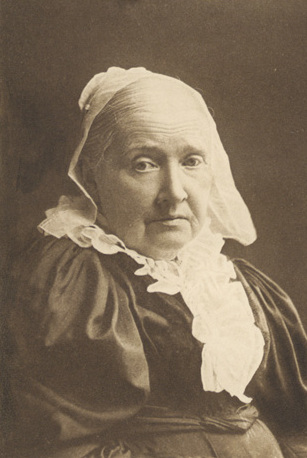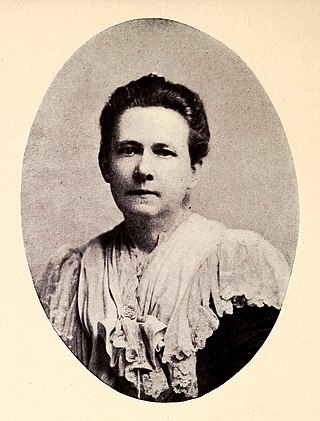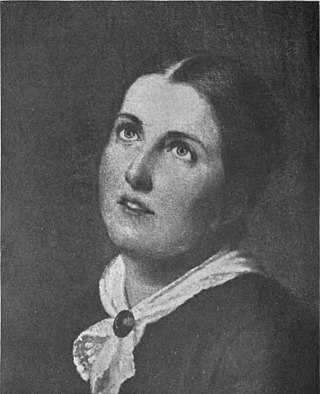Julia Ward may also refer to:
Julia is a usually feminine given name. It is a Latinate feminine form of the name Julio and Julius. The given name Julia had been in use throughout Late Antiquity but became rare during the Middle Ages, and was revived only with the Italian Renaissance. It became common in the English-speaking world only in the 18th century. Today, it is frequently used throughout the world.

Julia Ward Howe was an American author and poet, known for writing the "Battle Hymn of the Republic" as new lyrics to an existing song, and the original 1870 pacifist Mothers' Day Proclamation. She was also an advocate for abolitionism and a social activist, particularly for women's suffrage.

Samuel Gridley Howe was an American physician, abolitionist, and advocate of education for the blind. He organized and was the first director of the Perkins Institution. In 1824, he had gone to Greece to serve in the revolution as a surgeon. He arranged for support for refugees and brought many Greek children back to Boston with him for their education.

The "Battle Hymn of the Republic" is an American patriotic song written by the abolitionist writer Julia Ward Howe during the American Civil War.

Laura Elizabeth Howe Richards was an American writer. She wrote more than 90 books including biographies, poetry, and several for children. One well-known children's poem is her literary nonsense verse Eletelephony.

Laura Dewey Lynn Bridgman was the first deaf-blind American child to gain a significant education in the English language, forty-five years before the more famous Helen Keller; Bridgman’s friend Anne Sullivan became Helen Keller's aide. Bridgman was left deaf-blind at the age of two after contracting scarlet fever. She was educated at the Perkins Institution for the Blind where, under the direction of Samuel Gridley Howe, she learned to read and communicate using Braille and the manual alphabet developed by Charles-Michel de l'Épée.
Grapes of Wrath may refer to:

Howe is a neighborhood within the larger Longfellow community in Minneapolis. It is bordered by the Cooper and Longfellow neighborhoods to the north, Corcoran and Standish to the west, Hiawatha to the south, and the Mississippi River to the east. It is part of City Council Ward 12, represented by Aurin Chowdhury. The neighborhood and its elementary school are named for American writer and abolitionist Julia Ward Howe.

Maud Howe Elliott was an American novelist, most notable for her Pulitzer Prize-winning collaboration with her sisters, Laura E. Richards and Florence Hall, on their mother's biography The Life of Julia Ward Howe (1916). Her other works included A Newport Aquarelle (1883); Phillida (1891); Kasper Craig (1892); Mammon, later published as Honor: A Novel (1893); Roma Beata, Letters from the Eternal City (1903); Sun and Shadow in Spain (1908) ;The Eleventh Hour in the Life of Julia Ward Howe (1911); Three Generations (1923); Lord Byron's Helmet (1927); John Elliott, The Story of an Artist (1930); My Cousin, F. Marion Crawford (1934); and This Was My Newport (1944).
-- first stanza of Julia Ward Howe's Battle Hymn of the Republic conceived as both poem and lyrics to a popular tune and first published in February in The Atlantic Monthly
Howe is an English surname. Howe, when derived from the Old Norse: haugr, means hill, knoll, or mound and may refer to a tumulus, or barrow. However, when derived from Old English: hol, it can refer to a hollow or dell. Historically the surname was most commonly found in the Northeast of England and the Orkney and Shetland islands.
“Glory, Glory” is a possible name for several works:
Terrible swift sword is a phrase from "The Battle Hymn of the Republic" by Julia Ward Howe.
Howe House may refer to:

Henry Wadsworth Longfellow is a bronze statue, by William Couper, and Thomas Ball. The statue depicts American poet Henry Wadsworth Longfellow. It is located at the intersection of M Street and Connecticut Avenue, N.W. Washington, D.C., and was dedicated on May 7, 1909.

Samuel Ward III was an American banker.

The Julia Ward Howe School, also known as the Julia Ward Howe Academics Plus Elementary School is an historic American school that is located in the Fern Rock neighborhood of Philadelphia, Pennsylvania. It is part of the School District of Philadelphia.

Florence Marion Howe Hall was an American writer, critic, and lecturer about women's suffrage in the United States. Along with her two sisters, Laura Elizabeth Richards and Maude Howe Elliott, Hall received the first Pulitzer Prize for a biography, Julia Ward Howe.

Julia Rush Cutler Ward was an American occasional poet. One of her poems is preserved in Rufus Wilmot Griswold's Female Poets of America (1878).

Julia Romana Howe Anagnos was an American poet, daughter of Samuel Gridley Howe and Julia Ward Howe.